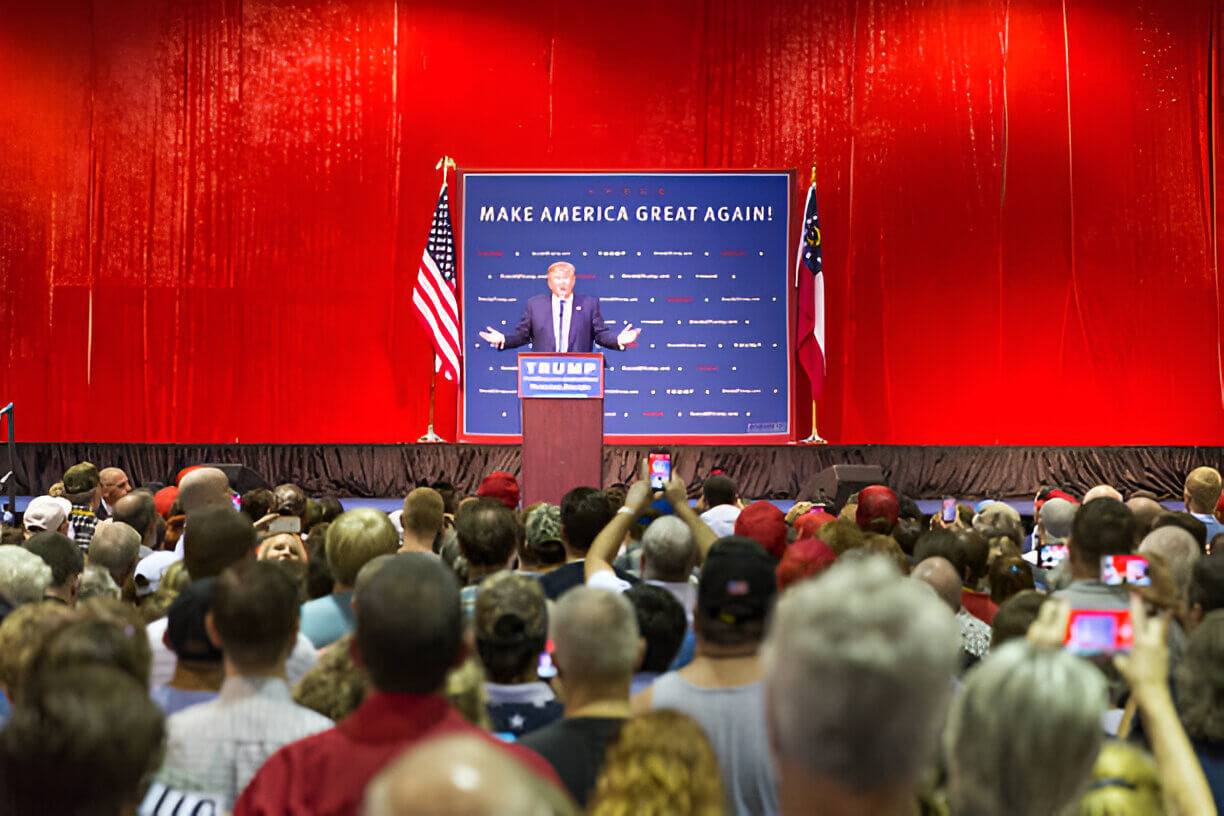A Bold Proposal for a U.S. Cryptocurrency Reserve
In a move that’s raising eyebrows across the financial world, former U.S. President Donald Trump has proposed the creation of a U.S. cryptocurrency reserve. This proposal, which blends the traditional financial system with digital assets, has the potential to reshape how the U.S. interacts with cryptocurrencies in the coming years. But what does this mean for the crypto market, the U.S. dollar, and the global economy?
Trump’s idea, though controversial, underscores the growing importance of digital currencies in the global financial landscape. Cryptocurrencies, particularly Bitcoin, have gained significant traction as both an investment vehicle and a store of value. By suggesting a U.S. cryptocurrency reserve, Trump is positioning the U.S. to have a more direct role in the evolution of digital currencies.
This proposal comes as central banks and governments around the world begin to experiment with digital currencies. However, Trump’s approach is unique in its ambition to merge the U.S. dollar’s influence with the growing trend of decentralized finance. The potential implications of such a move are vast, with both positive and negative consequences for the economy and the global financial system.
How a U.S. Cryptocurrency Reserve Could Work
In Trump’s proposal, the U.S. cryptocurrency reserve would serve as a safeguard for the U.S. dollar, offering a new layer of stability and credibility to the U.S. financial system. The idea is to back the U.S. dollar with a collection of digital assets, including Bitcoin and potentially other major cryptocurrencies. This could offer a hedge against inflation, volatility in traditional markets, and the ongoing decline in the dollar’s purchasing power.
The reserve would be managed by a central authority—likely the U.S. Treasury or the Federal Reserve—and would be used to back the value of the U.S. dollar. By incorporating cryptocurrency into the reserve, the U.S. would position itself as a forward-thinking nation in the world of finance, allowing it to harness the benefits of digital currencies while maintaining control over its fiat currency system.
While the details of the proposal remain vague, the concept suggests that cryptocurrencies would be integrated into the broader monetary system, helping to stabilize the U.S. dollar and the nation’s financial infrastructure. This would represent a major departure from the traditional model, where the U.S. dollar is primarily backed by government bonds and other assets.
The Potential Benefits of a U.S. Crypto Reserve
One of the primary benefits of a U.S. cryptocurrency reserve would be to enhance the stability of the U.S. dollar. Cryptocurrencies, particularly Bitcoin, have shown a remarkable ability to retain value over time, and incorporating them into a U.S. reserve could provide an additional layer of security against inflationary pressures.
In addition to stability, the reserve could help the U.S. maintain its position as the world’s financial leader. By embracing cryptocurrency in this way, the U.S. would be signaling its commitment to staying at the forefront of technological and financial innovation. This could attract foreign investment and bolster confidence in the U.S. financial system.
Moreover, a U.S. cryptocurrency reserve could serve as a model for other nations looking to incorporate digital currencies into their monetary policies. If successful, the U.S. could set the standard for how central banks and governments globally integrate crypto into their financial systems.
Challenges and Concerns
Despite the potential benefits, there are several challenges and concerns associated with Trump’s proposal. For one, there is the issue of volatility. Cryptocurrencies like Bitcoin are notoriously volatile, and their inclusion in a reserve could introduce risks to the stability of the U.S. dollar. While Bitcoin has demonstrated significant long-term growth, its short-term price fluctuations remain a concern for policymakers.
Additionally, there are concerns about regulatory hurdles. The U.S. has been slow to implement clear regulations for the cryptocurrency industry, and creating a reserve tied to digital assets could require significant changes to the regulatory framework. This would include questions about how cryptocurrencies are taxed, how they’re classified, and how financial institutions are allowed to interact with them.
Another issue is the potential for market manipulation. Cryptocurrencies are often seen as more susceptible to manipulation due to their relatively low market capitalization compared to traditional assets. The inclusion of these assets in a reserve could expose the U.S. financial system to market disruptions caused by speculative trading or sudden price crashes.
Lastly, there’s the broader concern about the U.S. dollar’s role in the global economy. If the cryptocurrency reserve were to succeed, it could shift the global financial system in unforeseen ways. Some experts worry that a reliance on digital assets could reduce the U.S. dollar’s dominance in international trade, particularly if other countries start following suit with their own cryptocurrency reserves.
The Impact on the Crypto Market
Trump’s proposal could have a profound effect on the cryptocurrency market itself. If the U.S. were to officially integrate digital assets into its reserve, it could significantly increase the legitimacy and acceptance of cryptocurrencies. This could lead to greater institutional adoption and potentially pave the way for more cryptocurrencies to be integrated into the global financial system.
The announcement of such a reserve would likely spur a surge in cryptocurrency prices. If Bitcoin and other major cryptocurrencies were backed by the U.S. government in some way, their perceived value would likely increase, attracting more investors. This could also spur innovation within the crypto industry, as other nations look to develop their own digital asset reserves.
However, this increased attention could also attract more regulation, which could limit the growth of the sector in some ways. While regulation could help protect investors and prevent fraud, it might also stifle innovation or create barriers for new players in the space.
The Geopolitical Implications
The geopolitical ramifications of Trump’s cryptocurrency reserve proposal are worth considering. If the U.S. were to lead the way in integrating cryptocurrency into the financial system, it could reshape global economic relations. Other nations might feel pressured to adopt similar policies, potentially leading to a new global standard for financial reserves.
Countries like China and Russia, who have shown interest in creating their own digital currencies, could see this as a challenge to their own financial systems. As the U.S. strengthens its position as a crypto-friendly nation, it could spur further competition among global powers to incorporate digital assets into their economies.
In the long term, this could lead to a decentralization of global financial power, where digital currencies, rather than national currencies, become the dominant means of exchange. This would undoubtedly alter the balance of power in the global financial system, creating both opportunities and risks for investors and nations alike.
Conclusion
President Trump’s proposal to create a U.S. cryptocurrency reserve is a bold move that could redefine the relationship between digital assets and traditional finance. While the potential benefits include increased stability for the U.S. dollar and a stronger global financial position, there are significant risks and challenges to consider. The volatility of cryptocurrencies, regulatory hurdles, and concerns about market manipulation all need to be addressed before such a reserve could become a reality.
For the crypto market, this proposal could be a game-changer, increasing legitimacy and encouraging institutional investment. However, it could also bring more regulation, which could slow innovation. The geopolitical implications are equally significant, as other countries may follow the U.S.’s lead in adopting digital currencies, potentially shifting the balance of power in global finance.
As the proposal moves forward, the future of the U.S. cryptocurrency reserve remains uncertain. However, one thing is clear: it has ignited a conversation about the future of digital currencies and their role in the global economy.

About The Author
Name: Frasat Ali
Role: Founder & Lead Analyst at LatestCryptoInfo.com
Experience: 5+ Years in Blockchain & Cryptocurrency Markets
Specializations: Bitcoin, Ethereum, DeFi, NFTs, and Crypto Regulations
Frasat Ali is a seasoned cryptocurrency analyst with over five years of hands-on experience in blockchain technology, trading, and market research. As the founder of LatestCryptoInfo.com, he is dedicated to providing accurate, unbiased, and actionable crypto news to help investors make informed decisions. Read More

Stay Ahead in Crypto!
Follow us on Facebook for the latest market updates, expert insights, and real-time predictions on Bitcoin and other top cryptocurrencies. Don’t miss out – stay informed and make smarter investment choices today!
